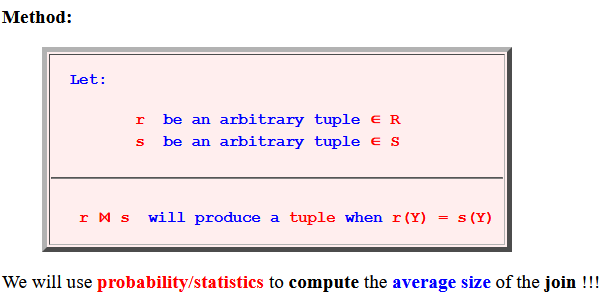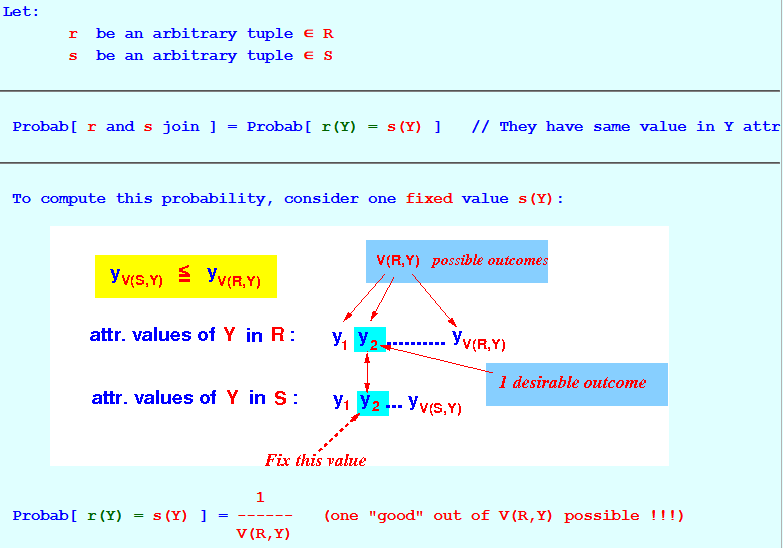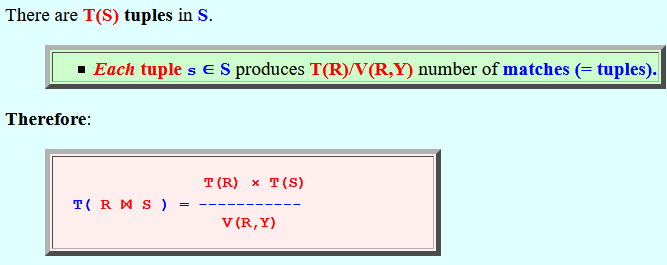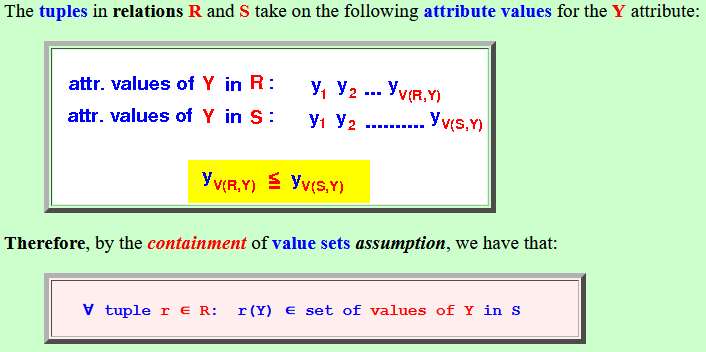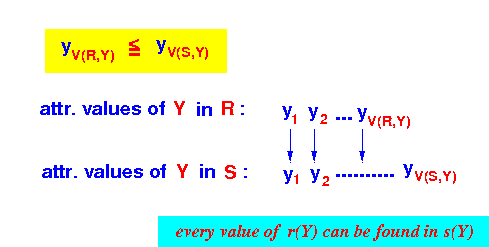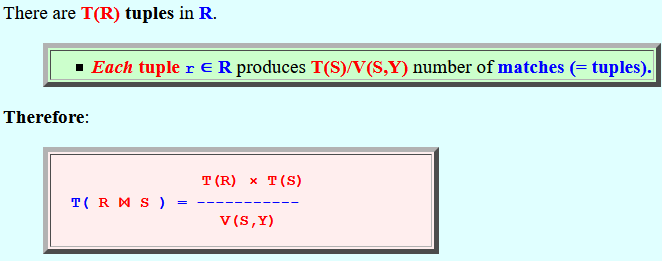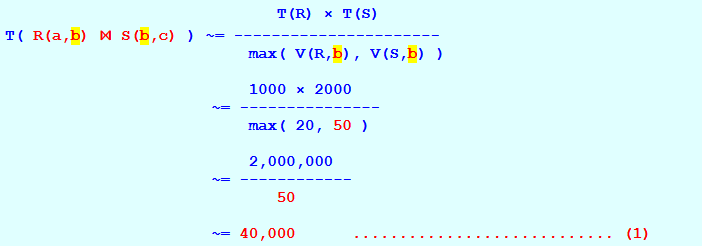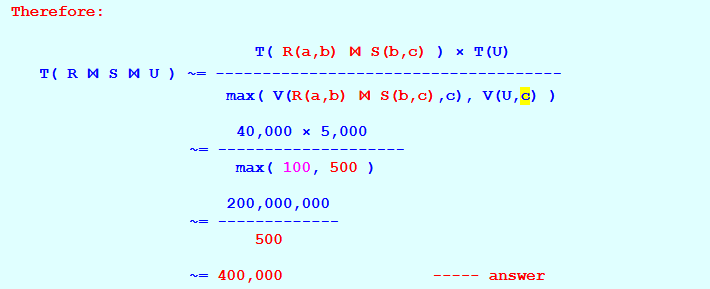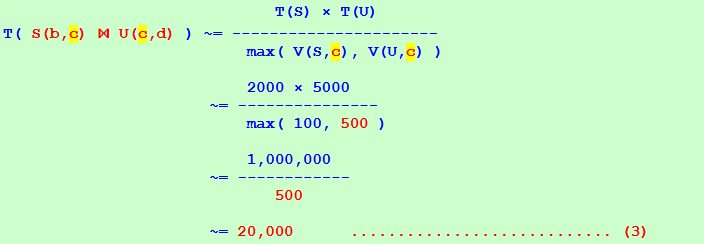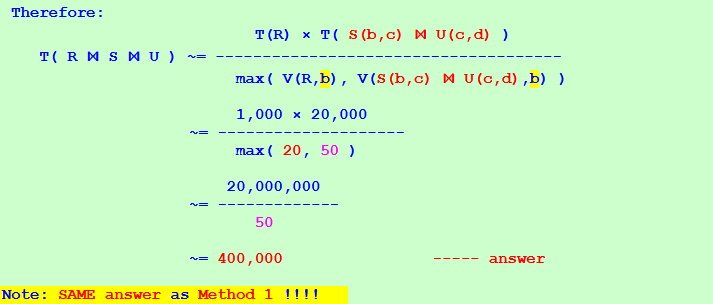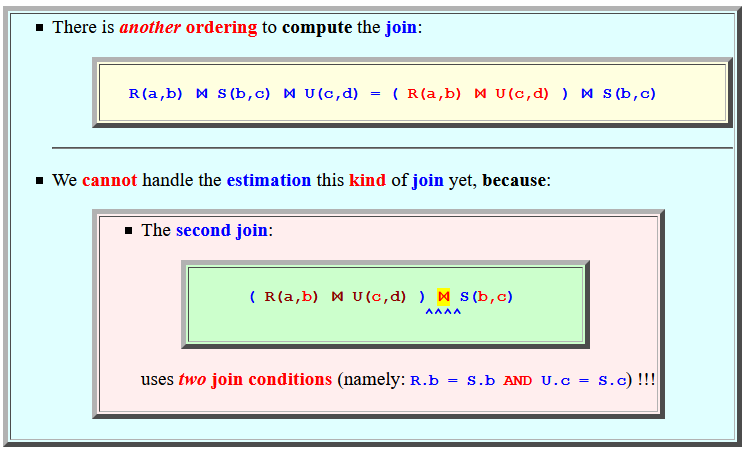Slideshow:
- Given:
- W =
R(X,Y)
⋈
S(Y,Z)
Y is one attribute in both relations
What is an estimate for size of T( R(X,Y) ⋈ S(Y,Z) ) ???
- W =
R(X,Y)
⋈
S(Y,Z)
- Method:
Let: r be an arbitrary tuple ∈ R s be an arbitrary tuple ∈ S
r ⋈ s will produce a tuple when r(Y) = s(Y)We will use probability/statistics to compute the average size of the join !!!
- 64,000 question:
- What is the probability (chance) that r(Y) = s(Y) ???
- Case 1:
V(R,Y) ≥ V(S,Y)
- The tuples in
relations
R and S
take on the following
attribute values for
the Y attribute:
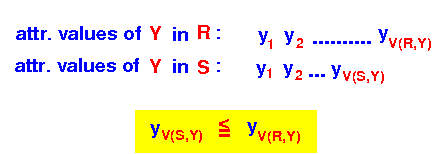
Therefore, by the containment of value sets assumption, we have that:
∀ tuple s ∈ S: s(Y) ∈ set of values of Y in R
Graphically:
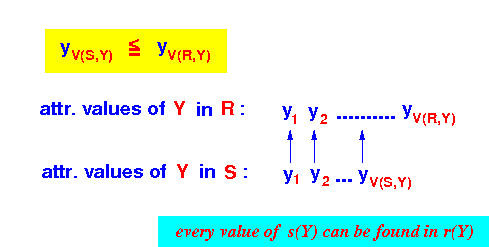
- We can compute
the probability that
2 tuples
(one from R and one from S)
join
as follows:
Let: r be an arbitrary tuple ∈ R s be an arbitrary tuple ∈ S
Probab[ r and s join ] = Probab[ r(Y) = s(Y) ] // They have same value in Y attr
To compute this probability, consider one fixed value s(Y): 1
Probab[ r(Y) = s(Y) ] = ------ (one "good" out of V(R,Y) possible !!!)
V(R,Y)
1
Probab[ r(Y) = s(Y) ] = ------ (one "good" out of V(R,Y) possible !!!)
V(R,Y)
- Using this
probability,
the number of
tuples in
R(X,Y)
⋈
S(Y,Z)
can be
estimated as
follows:
- The probability of
a match between
a tuple in S and
R is:
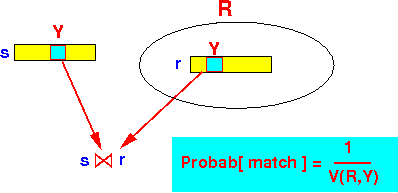
- There are T(R) tuples in
R.
Therefore, one tuple s ∈ S will produce this many # of matches:
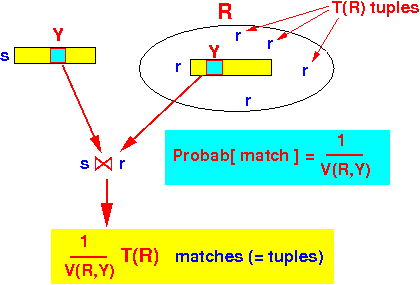
- There are T(S) tuples in
S.
- Each tuple s ∈ S produces T(R)/V(R,Y) number of matches (= tuples).
Therefore:
T(R) × T(S) T( R ⋈ S ) = ----------- V(R,Y)
- The probability of
a match between
a tuple in S and
R is:
- The tuples in
relations
R and S
take on the following
attribute values for
the Y attribute:
- Case 2:
V(S,Y) ≥ V(R,Y)
(same reasoning, replace the
roles of R and S)
- The tuples in
relations
R and S
take on the following
attribute values for
the Y attribute:
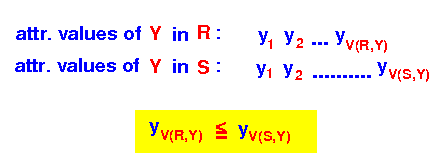
Therefore, by the containment of value sets assumption, we have that:
∀ tuple r ∈ R: r(Y) ∈ set of values of Y in S
- We can compute
the probability that
2 tuples
(one from R and one from S)
join
as follows:
Let: r be an arbitrary tuple ∈ R s be an arbitrary tuple ∈ S
Probab[ r and s join ] = Probab[ r(Y) = s(Y) ] // They have same value in Y attr
To compute this probability, consider one fixed value r(Y): 1
Probab[ r(Y) = s(Y) ] = ------ (one "good" out of V(S,Y) possible !!!)
V(S,Y)
1
Probab[ r(Y) = s(Y) ] = ------ (one "good" out of V(S,Y) possible !!!)
V(S,Y)
- The number of
tuples in
R(X,Y)
⋈
S(Y,Z)
can be
estimated as
follows:
- The probability of
a match between
a tuple in R and
S is:
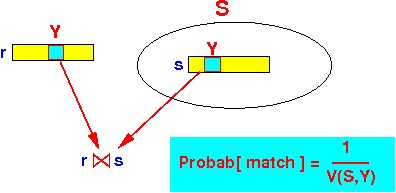
- There are T(S) tuples in
S.
Therefore, one tuple r ∈ R will produce this many # of matches:
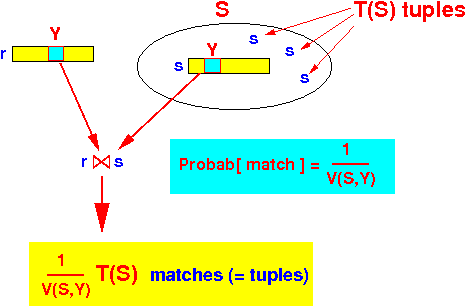
- There are T(R) tuples in
R.
- Each tuple r ∈ R produces T(S)/V(S,Y) number of matches (= tuples).
Therefore:
T(R) × T(S) T( R ⋈ S ) = ----------- V(S,Y)
- The probability of
a match between
a tuple in R and
S is:
- The tuples in
relations
R and S
take on the following
attribute values for
the Y attribute:
- Conclussion:
T(R) × T(S) T( R(X,Y) ⋈ S(Y,Z) ) ~= ---------------------- max( V(R,Y), V(S,Y) )
- Information on the
input relations:
R(a,b) S(b,c) U(c,d) ======================================================= T(R) = 1000 T(S) = 2000 T(U) = 5000 V(R,b) = 20 V(S,b) = 50 V(S,c) = 100 V(U,c) = 500Problem:
- Estimate the size of R ⋈ S ⋈ U
- Method 1: (ordering 1)
R(a,b) ⋈ S(b,c) ⋈ U(c,d) = ( R(a,b) ⋈ S(b,c) ) ⋈ U(c,d)
T(R) × T(S) T( R(a,b) ⋈ S(b,c) ) ~= ---------------------- max( V(R,b), V(S,b) ) 1000 × 2000 ~= --------------- max( 20, 50 ) 2,000,000 ~= ------------ 50 ~= 40,000 ............................ (1)
The estimate of the size the join ( R(a,b) ⋈ S(b,c) ) ⋈ U(c,d) is: T( R(a,b) ⋈ S(b,c) ) × T(U) ~= -------------------------------------- max( V(R(a,b) ⋈ S(b,c),c), V(U,c) ) ^^^^^^^^^^^^^^^^^^^^ What is this value ????
From the preservation of value sets assumption, we have: V(R(a,b) ⋈ S(b,c),c) = V(S,c) // V(S,c) = 100 according to data = 100 ...................... (2) Therefore: T( R(a,b) ⋈ S(b,c) ) × T(U) T( R ⋈ S ⋈ U ) ~= ------------------------------------- max( V(R(a,b) ⋈ S(b,c),c), V(U,c) ) 40,000 × 5,000 ~= -------------------- max( 100, 500 ) 200,000,000 ~= ------------- 500 ~= 400,000 ----- answer
- Method 2: (ordering 2)
R(a,b) ⋈ S(b,c) ⋈ U(c,d) = R(a,b) ⋈ ( S(b,c) ⋈ U(c,d) )
T(S) × T(U) T( S(b,c) ⋈ U(c,d) ) ~= ---------------------- max( V(S,c), V(U,c) ) 2000 × 5000 ~= --------------- max( 100, 500 ) 1,000,000 ~= ------------ 500 ~= 20,000 ............................ (3)
The estimate of the size the join R(a,b) ⋈ ( S(b,c) ⋈ U(c,d) ) is: T(R) × T( S(b,c) ⋈ U(c,d) ) ~= -------------------------------------- max( V(R,b), V(S(b,c) ⋈ U(c,d),b) ) ^^^^^^^^^^^^^^^^^^^^ What is this value ???
From the preservation of value sets assumption, we have: V(S(b,c) ⋈ U(c,d),b) = V(S,b ) // V(S,b) = 50 according to data = 50 ...................... (2) Therefore: T(R) × T( S(b,c) ⋈ U(c,d) ) T( R ⋈ S ⋈ U ) ~= ------------------------------------- max( V(R,b), V(S(b,c) ⋈ U(c,d),b) ) 1,000 × 20,000 ~= -------------------- max( 20, 50 ) 20,000,000 ~= ------------- 50 ~= 400,000 ----- answer Note: SAME answer as Method 1 !!!!
- Postscript
- There is another ordering
to compute the join:
R(a,b) ⋈ S(b,c) ⋈ U(c,d) = ( R(a,b) ⋈ U(c,d) ) ⋈ S(b,c)
- We cannot handle
the estimation this
kind of
join yet,
because:
- The second join:
( R(a,b) ⋈ U(c,d) ) ⋈ S(b,c) ^^^^uses two join conditions (namely: R.b = S.b AND U.c = S.c) !!!
- The second join:
- There is another ordering
to compute the join:

